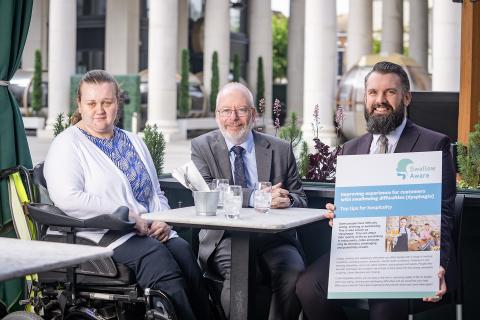Health and hospitality team up to improve lives of people with swallowing difficulties

The Public Health Agency (PHA) and Hospitality Ulster have launched a new factsheet to help the food and drink industry understand and improve the lives of people with swallowing difficulties.
Dysphagia is the medical term for eating, drinking and swallowing difficulties and it can affect people at any stage of their lives. It can often occur alongside a range of medical conditions, including, dementia, cancer, stroke, some mental health conditions, Parkinson’s disease and learning disabilities.
Dysphagia can impact people’s quality of life and their experience of socialising in restaurants, cafes and pubs. Going out to eat can be a stressful and challenging experience and for some people, potentially unsafe.
Aidan Dawson, Chief Executive at the PHA, said: “Many social occasions revolve around food and drink, such as going out for a coffee with friends or attending family events in restaurants.
“People who live with dysphagia are at higher risk of food or drink going into their airway. This can lead to excessive coughing and even choking. They often have to think about how they will be able to eat or drink at these events and venues, sometimes they will avoid them entirely.
“The hospitality sector can play a vital role in helping to improve the quality of life for people living with dysphagia, to provide a good quality experience for them and their families. We hope the factsheet will help to alleviate some of the anxiety for those who experience dysphagia who want to eat and drink outside their homes, helping to improve their quality of life and reduce the potential of social isolation and poorer health outcomes.”
The PHA and Hospitality Ulster have worked in partnership with people who live with dysphagia, the community and voluntary sector and Health and Social Care Trusts, to develop a user-friendly factsheet for the hospitality sector, with ten top tips to help improve the experience of people living with dysphagia when they socialise.
The swallow aware factsheet for hospitality is available at www.pha.site/HospitalityFactsheet
The factsheet explains what dysphagia is and outlines the ways the hospitality sector can help those who have swallowing difficulties to a have a better and safer experience eating and drinking when out socialising.
Joel Neill Operations Director at Hospitality Ulster said: “We are delighted to be involved in the development of this important factsheet which provides useful advice for businesses in the hospitality sector to help support people with eating, drinking and swallowing difficulties.
“Our members value all customers and if we are able to support people with dysphagia and their families to have more choice in their social life and feel confident when visiting various hospitality outlets, then it’s a win all round for the businesses and their customers.”
Gemma McNally, whose son Caleb lives with a swallowing difficulty, welcomed the new initiative said: “Raising awareness of swallowing difficulties in the hospitality sector is invaluable. When we find somewhere to eat as a family that recognises our son’s needs and helps to accommodate him, it means we have a much more relaxed and enjoyable meal. We are also more likely to return to that restaurant or café more often.”
Ruth Sedgewick, Head of Royal College of Speech and Language Therapists (RCSLT) said: “This campaign will help to highlight the challenges and practical solutions which can improve someone’s hospitality experience. Importantly, it will also help to keep people safe when eating out and give them the confidence to enjoy social pleasures. We congratulate Hospitality Ulster for working with the PHA, Health and Social Care Trusts and community and voluntary partners in developing this important campaign.”
A wallet card has also been produced to support service users who experience dysphagia. The card has a QR code which links directly to the hospitality factsheet. When shown to hospitality staff they are able to quickly read through the ten top tips to support the customer.
For further information about dysphagia visit www.pha.site/Dysphagia
PHOTO CAPTION: L-R Leah Bachelor, Service User, Aidan Dawson CEO, Public Health Agency (PHA), Joel Neill, Operations Director, Hospitality Ulster
- Help and support is available to help people to live well with a swallowing difficulty. Contact a health care professional, such as your GP or a Speech and Language Therapy Service to get support
- The swallow aware wallet card can be obtained by the service user following a speech and language swallow assessment from a Speech and Language Therapist
- A wallet card can also be obtained by emailing the Public Health Agency at dysphagiani@hscni.net
- Dysphagia is the medical term for swallowing difficulties, which can affect anyone at any stage of their life. The condition can range from some people with dysphagia having problems swallowing certain foods or liquids, while others can't swallow at all
- Research has shown that 16-23% of the population have difficulties eating, drinking or swallowing, rising to 27% in those over 76 years of age.
- For more information and research visit Royal College of Speech and Language Therapist’s website www.rcslt.org
- Within the population, issues with eating drinking and swallowing can occur in:
- Up to 100% of people with motor neurone disease
- Up to 90% of people in intensive care
- 85% of people with dementia
- 79% of people at the end of their lives
- 55% of people with head and neck cancer
- 50% of people with Parkinson’s disease
- 42% of people who have had a stroke
- 31% of people with multiple sclerosis
- 8-17% of people with a learning disability
